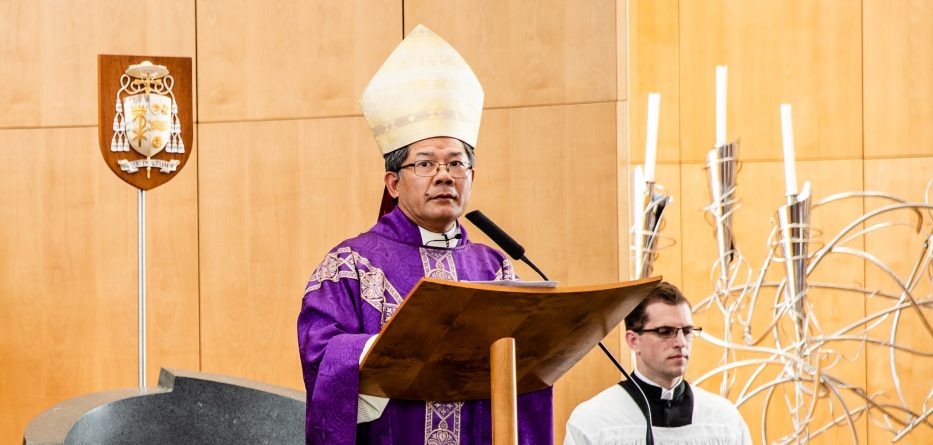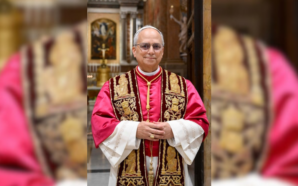Most Reverend Vincent Long Van Nguyen OFM Conv DD STL, Bishop of Parramatta
Homily for the First Sunday of Lent
Readings: Dt 26:4-10; Rom 10:8-13; Luke 4:1-13
Power, control and immunity versus the vulnerability of the cross
Dear brothers and sisters,
This week, as the tragic events at home and abroad unfolded before us, we experience a certain sense of helplessness. Beyond the sentiments of sympathy and solidarity towards those who suffer terrible tragedies, we find ourselves vulnerable, mortal and defenceless. In as much as we want to change the world for the better, we wrestle with our human condition, our limitations and our own vulnerability.
Lent is a season in which we are called to embrace in earnest a pattern of humility, powerlessness, of dying and rising in Christ. For this pattern was the heart of his modus operandi. As we reflect on both the experience of God’s people in the desert and that of Jesus, we are encouraged to walk the long and hard road of humility, vulnerable trust and relational faithfulness.
The Word of God today helps us to come to terms with our present predicament and focus our attention on what truly matters. It speaks of the need to enter a time of solitude and discernment in order to deepen our commitment, to ground our core values and to re-align our mission with God’s purpose for us.
In the first reading, we hear what is known as the Creed of the Chosen People. In simple and powerful words, Moses reminds the hitherto wandering Jews of the God who accompanied them from slavery into freedom and formed them into a model nation. “The Lord heard our voice and saw our misery…; and the Lord brought us out of Egypt. He gave us this land, a land where milk and honey flow.” The God of Israel is the God of justice, freedom and love. Therefore, the Israelites must embody these divine characteristics in their identity and mission. Moses summons them to form a new society which is an antidote for oppression and domination, one in which the care economy and the embrace of the vulnerable will be its beating heart.
The Gospel speaks of a strengthening of divine purpose. It tells us the story of Jesus’ temptation which is a critical time before his public ministry. The forty days in the wilderness ironically bring him face to face with the revelation he has received at his baptism. This intense experience of Jesus gives us a window into what it means to be the Beloved of God and the One in whom God delights. In effect, he will have decided in favour of the way of God. At every instance, he will have chosen the long hard road of love in powerlessness and vulnerability instead of brandishing the weapon of power at his disposal.
First, when Jesus is tempted to turn the stone into bread, he responds by way of accepting his vulnerability. It is in our human nature to want to be in control and to have everything at our disposal. Jesus shows us an alternative. By recognizing God as the true bread, he calls us to reorder our relationships so that they are aligned to the Creator’s intention, which is the enabling and enhancement of life for all.
The second temptation is to be the superhero. It’s the cult of popularity, which is rampant in our success-driven society. Jesus does not buy into this illusion. He does not throw himself down from the parapet of the temple or later, the cross. He shows us the way of enduring love.
Finally, Jesus is tempted to be free from all pain, suffering and hurt. “[God] will command his angels concerning you, to protect you,” the devil promises Jesus. The implication is that if we are beloved of God, then God will keep us safe. Safe from physical and emotional harm, safe from frailty and disease, safe from accidents, safe from death. It is such an enticing lie, because it targets our deepest fears about what it means to be human in a broken and dangerous world.
Here again, Jesus shows another way of dealing with suffering. It is not a miraculous escape, an impenetrable shield and a spectacular rescue. It is, rather, the cross. He teaches us that we are loved in our vulnerability. Not out of it. We are the children of a God who accompanies us in our suffering, not a God who guarantees us a lifetime of immunity.
Brothers and sisters,
Lent is a liminal period, that is, a time of ambiguity, searching, questioning and ultimately re-aligning our direction to God’s purpose. This was what the people of God did during their wilderness experience. Likewise, Jesus was led by the Spirit to a place where he was tested to his extreme limits. In the end, he proved himself steadfast, firmly grounded and utterly committed to the way that God had envisaged for him. He rejected the way of control, power and immunity. He chose, instead, the path of humility, vulnerability and surrender.
We may not have the answer to the multitude of human sufferings in the world. But the God of Jesus assures us that he is with us in our pain and on our side. He shows us the path of kenosis, of self-emptying, of accepting death and death on the cross. That is also the path of discipleship, the path of the Beatitudes, of love in being hated, joy in weeping, living in dying for others. Let us embrace this way of the humble Servant with courage, faith and perseverance.








